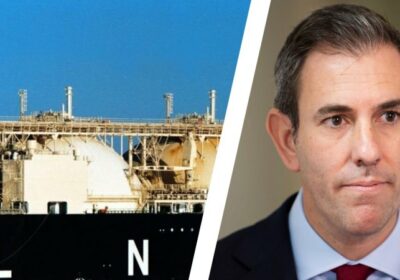Government poised to tap $3b more from fossil fuel super profits

Save articles for later
Add articles to your saved list and come back to them any time.
Treasurer Jim Chalmers is preparing to raise billions of dollars more in taxes from offshore oil and gas companies to spend on the cost-of-living crisis, as the energy industry makes windfall profits from record fossil fuel prices fanned by Russia’s war on Ukraine.
The Albanese government has been considering changing the settings of the $2 billion-a-year Petroleum Resources Rent Tax that applies to offshore oil and gas projects. Sources familiar with the looming changes, who are not authorised to speak publicly before next week’s budget, said the reforms would be designed to deliver around $3 billion more in tax revenue over the next four years.
Treasurer Jim Chalmers is considering changes to oil and gas taxes.Credit: Michele Mossop, Alex Ellinghausen
Liquified national gas, one of Australia’s most valuable exports, is forecast to hit $91 billion in export earnings this financial year – three times more than in 2020-21 – after a ban on Russian energy exports following its invasion of Ukraine.
Currently levied on offshore oil or gas projects at 40 per cent of their taxable profit, the PRRT allows generous deductions for capital investments, raising questions over the revenue the tax raises compared with the billions reaped in profits by gas giants including Woodside, Chevron and Santos.
A $3 billion boost in taxes will likely meet opposition both from an industry that has been hit with a raft of reforms since December and from the Greens, as the minor party uses its numbers in the Senate to lobby for a massive tax impost on the gas industry.
The 2022-23 federal budget papers show the PRRT is expected to raise $2.6 billion this financial year, but will thereafter decline steadily over the next four years to about $2 billion by 2025-26.
Treasurer Jim Chalmers said last month he had received a Treasury review of the PRRT but had not determined when the government would respond to the findings. He said he was concerned that the tax was “not up to scratch” and “the Australian community, I think, shares those concerns”.
Grattan Institute energy director Tony Wood said the Albanese and former Morrison governments have acknowledged the PRRT was outdated and was failing to deliver the same returns as other countries with major gas production in their jurisdiction.
“I think the government is of a mind to make changes right now,” Wood said. “It was a crazy thing in the first place and should have been addressed earlier.”
Wood said while the gas industry “will obviously feel that any changes are terrible”, public opinion backs tighter regulation on fossil fuels, which will eventually be replaced by the rise of renewable energy.
Wood said one option for government was to alter the settings to deliver greater returns over the next decade or more, but require companies to pay the majority of their future tax bill sooner to boost the budget bottom line.
“They [government] might bring forward revenue that would at least theoretically not be collected for some years,” he said.
“The government could argue you’re going to have to pay anyway, but we want it now.”
In a speech to the National Press Club last month, Woodside chief executive Meg O’Neill said “overreaching” on tax reforms could risk undermining future revenue.
Woodside and other oil and gas producers are resisting any new tax imposts.Credit: Woodside
“We urge the government, in any changes to the tax framework, to consider the long term and preserve Australia’s ability to attract the next generation of investment, jobs and energy supply,” O’Neill said.
Australian Petroleum Production and Exploration Association chief executive Samantha McCulloch said the gas industry was already paying more to government and will nearly triple the sector’s tax payments within 12 months to $16 billion this financial year.
Significant reforms to the PRRT could net the federal budget $94.5 billion over the next 10 years, according to Parliamentary Budget Office modelling conducted for the Greens.
Greens leader Adam Bandt said he was concerned Labor’s proposed changes would be timid, and fail to make gas companies pay their “fair share of tax”.
“This is the best chance we’ll have in a generation to make these corporations actually pay the gas tax,” Bandt said.
A hike to the PRRT would follow a long list of extra regulations imposed on the industry. The government in December set a $12-a-gigajoule cap on the price of domestic gas sales, imposed a mandatory code of conduct for the industry, set compulsory emissions cuts under the safeguard mechanism, and tightened rules under the Australian Domestic Gas Security Mechanism to redirect exports back to Australia if supply runs short.
Rick Wilkinson, chief executive of Adelaide-based consultancy EnergyQuest, said hiking the PRRT, combined with other market interventions, could raise Australia’s “risk profile” and discourage much-needed international investment in both traditional fuels and renewables.
“Projects needed to get to net-zero are going to cost eye-watering sums of money and rely on overseas capital,” Wilkinson said.
“We need to understand that these are multinational energy companies who are involved in gas as well as renewables, and they will make note of how they are treated with foundation contracts and foundation projects.”
Cut through the noise of federal politics with news, views and expert analysis from Jacqueline Maley. Subscribers can sign up to our weekly Inside Politics newsletter here.
Most Viewed in Politics
From our partners
Source: Read Full Article

